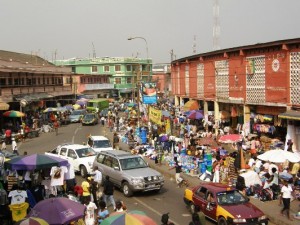Expensive African cities dissuading investors – World Bank
 African cities have been identified as part of the costliest among their peers in the world for both businesses and for households making them unattractive for potential global investors.
African cities have been identified as part of the costliest among their peers in the world for both businesses and for households making them unattractive for potential global investors.
The latest World Bank report launched today February 9, 2017 says African cities are 29 per cent more expensive than cities in countries at similar income levels.
It said African households face higher costs relative to their per capita GDP than do households in other regions – much of it accounted for by housing, which costs them a full 55 per cent more than in other regions.
In Dar es Salaam, for example, 28 per cent of residents live at least three to a room; in Abidjan, 50 per cent. And in Lagos, Nigeria, two out of three people live in slums.
Adding to this, city dwellers pay around 35 per cent more for food in Africa than in low-income and middle-income countries elsewhere. Overall, urban households pay 20 – 31 per cent more for goods and services in African countries than in other developing countries at similar income levels.
The report points out that urban workers in Africa are also forced to pay high commuting costs, or they cannot afford to commute by vehicle at all, and the informal minibus systems are far from cost efficient, leaving many to have to walk to work.
The need to walk to work limits these residents’ access to jobs. Without sufficient formal development, informal settlements that are relatively central and thus close to jobs – such as Kibera in Nairobi, and Tandale in Dar es Salaam – are constantly growing in population, the report said.
It also observed that the need for higher wages to pay higher living costs makes businesses less productive and competitive, keeping them out of tradable sectors and as a result, African cities are avoided by potential regional and global investors and trading partners.
Given these costly conditions, the opportunities for tremendous gains in efficiency and productivity can lead to African cities becoming a strong catalyzer of economic development, it added.
The report recommends, that to free Africa’s cities from their low-development trap, Africa needs to be set on a path toward physical and economic density, connecting them for higher efficiency and boosting expectations for the future.
“What cities do now will determine their shape and efficiency not just for years to come, but for decades or even centuries,” Ede Ijjasz-Vasquez, Senior Director of the World Bank’s Social, Urban, Rural and Resilience Global Practice noted.
It further proposes that since Africa’s cities will experience growth of an additional 170 million in 2025, the continent has a critical role to play in countries’ economic growth and Improving conditions for people and businesses in African cities by aggressively investing in infrastructure and reforming land markets.
The report themed “Improving Conditions for People and Businesses in Africa’s Cities is Key to Growth” pointed out that Africa’s urban population will double over the next 25 years, reaching one billion people by 2040.
“What Africa needs are more affordable, connected, and livable cities. Improving the economic and social dividends from urbanization will be critical as better developed cities could transform Africa’s economies,” Makhtar Diop, World Bank Vice President for Africa said.
By Pamela Ofori-Boateng
Copyright ©2017 by Creative Imaginations Publicity
All rights reserved. This article, or any portion thereof may not be reproduced or used in any manner whatsoever without the express written permission of the publisher except for the use of brief quotations in reviews.
